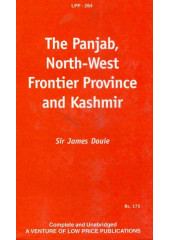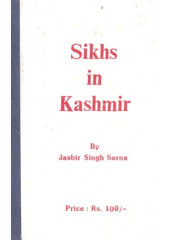Monday to Saturday - 10:00 Am to 9 PM
Now Enjoy Bulk Discounts on Books as Mentioned Below
These Discounts are in addition to the Discounts on Individual Books (Visible as Bulk Discount for Books in Cart)
Extra 10% Off If Books Purchased Exceeds Rs 3000 or 75 USD or 60 GBP or 60 Euro or 100 AUD or 100 CAD
Extra 15% Off If Books Purchased Exceeds Rs 6000 or 150 USD or 120 GBP or 120 Euro or 200 AUD or 200 CAD
Extra 20% Off If Books Purchased Exceeds Rs 15000 or 225 USD or 180 GBP or 180 Euro or 300 AUD or 300 CAD
Extra 25% Off If Books Purchased Exceeds Rs 30000 or 300 USD or 240 GBP or 240 Euro or 400 AUD or 400 CAD
Preface Of The Book 'A Glossary Of The Tribes And Castes Of The Punjab and North-West Frontier Province (Set Of Vol.3)' By H. A. Rose
THE compilation of this the 1st volume of the Glossary of Tribes and Castes of the Punjab and North-West Frontier Province has occupied my leisure since the year 1903 when the Ethnographic Survey of India was inaugurated by the late Sir Herbert Risley. Fourteen years may appear a long time to have spent on this compilation, but the leisure of an official in India is necessarily limited and I feel that another four or five years might with advantage have been deveted to arranging my material better and completing various lines of enquiry. I may for instance cite the section on Hinduism, especially on Hinduism in the Himalayas, which seems to me to be painfully incomplete and is probably inaccurate. The enquiries made by Mr. H. W. Emerson, I.O.S., in the Bashahr State show that many primitive customs which have been more or less worked into the various forms of. Hinduism survive in that part of the Himalaya& and I have no doubt whatever that similar survivals could be discovered by keen-witted officers in Kulu, Chamba and elsewhere. Officers who are gifted with flai1· often discover matters of historical and ethnographical importance which their less-talented predecessors have overlooked, despite all their efforts to add to our knowledge. Mr. G. C. L. Howell, I.O.S., has, for example, unearthed some valuable historical facts regarding the ancient kingdom of Makarasa in Kv.lu and the old Tibetan trade-routes in that valley. He has shown that these trade-routes have left their influence on the ethnical constituents of that part of the Himalayas and I have no doubt that facts of equal interest await sagacious investigators in other parts of these Provinces. But too often during the fourteen years that I have been occupied in my enquiries I have felt that as an official my leisure was entirely inadequate to do justice to them, and I have also felt that other officers also had little or no leisure to supplement my materials. I feel that one of the greatest perils which awaits an investigator in India is the temptation to overlook points which come within his personal observation and to shirk personal inquiry, because it involves personal responsibility. One always likes to have 'authority' to cite for a fact or its explanation. But I have also felt the truth that there is in India ' neither collaborator nor substitute in official life,' as Mr. J. C. Jack, I.C.S., and temporarily of the Royal Field Artillery, expre8ses the isolation which an investigator must always feel in India. Hence I trust that the present volume will be acceptable not as a work on the religious and social observance of the Punjab people so much as a compilation of raw material on which fuller and more systematic investigations may be based. This volume has been pieced together as material came to hand and as new books and writings came to my notice. For example in writing on Jainism I laboured under the great disadvantage of not having Mrs. Sinclair Stevenson's work The Heart of Jainism to refer to before that section had been printed. That valuable work only appeared in 1915. The section on Islam is to my great regret very incomplete, because when I began to compile it I had no conception of the wealth of material which existed to throw light on the continuity of Islamic thought and tradition from mediaeval times down to the present day. An Indian friend has proposed to translate this section into Urdu and publish it separately with a view to the collection of additional material and the correction of the numerous errors into which I must have fallen. I hope that this proposal will materialise and that some day an Indian scholar with a competent knowledge of Arabic and Islamic religious literature will write a work which will altogether supersede the fragment which I have been able to compile. Hinduism is so vast a subject that I do not think any one inquirer could do justice to it. It appears to me for example that a thoroughly scientific study of the worship of Devi would be of immense interest and importance not only as a contribution to the history of Hinduism but also as a chapter in the evolution of human thought. The excellent series of booklets on the religious life of India inaugurated by the Right Revd. Dr. Whitehead, Bishop of Madras, in The Village Gods of South India, will provide an investigator with materials for such studies, but in the history of such cults as those of Devi a vast deal remains to be done and the same remark will doubtless apply to the forthcoming studies on Vaishnavism, the Shaiva Siddhanta and kindred topics. It is understood that Dr. J. P. Vogel is taking up the study of Naga-worship which fully merits scientific examination and analysis. I for one do not regard Naga-deities as the idols of a primitive or degraded superstition. Just as Islam has its unseen world, so. pre-Buddhist India bad evolved a belief in an under-world of spiritual or immaterial beings who manifested themselves in two main things that came from the- earth, the serpent and the stream. Both are associated with fertility; as the earth is the mother of vegetation and the sun its father. 1 But on this simple basis of metaphorically explained fact metaphysical thought has built up endless theories which find expression in an infinite range of popular beliefs as well as in philosophic literature. The only way in which the mazes of Hindu thought can ever be made intelligible to the Western mind will be by a scientific systematization of each phase of that thought.
I have not attempted to write an introductory essay on caste, but I may commend to the reader's notice the valuable chapter so entitled in the late Mr. R. V. Russell's work on The Tribes and Castes of the Central Provinces of India, The more one studies castes in the works of Nesfield, Ibbetson, Risley and other writers the more one sees, I think, that caste like law may be defined as a function of economics. In the lower groups of Indian society this function is easily recognised and it is practically the only function which caste expresses. In the higher castes the function is not so transparently clear but examination seldom fails to reveal that it is the dominant function and always the originating function. But the history of caste closely resembles the history of law. Human society begins by organising itself in the manner most effective to produce material results and defend itself against its enemies. Thus caste in its inception embodies, as Sister Nivedita has pointed out, the conception of national duty. But duty carries with it certain privileges. The man who does his fluty to society is justly entitled to his reward. The tenant-in-chief who held laud in feudal England under the King held his lands as a reward for and as a condition of the military service which he was bound to render to the State in time of need. But a right contingent on the performance of a duty always seems to tend to become an absolute and unconditioned privilege. The feudal right or tenure passes into an indefeasible right of property which belongs to the bolder adversely to the State as well as to his fellow-subjects. It appears to me that the history of caste has followed a very similar line of development. Caste privileges begin as a reward for services rendered or due to be rendered.
A Glossary Of The Tribes And Castes Of The Punjab and North-West Frontier Province (Set Of Vol.3) - Book By H. A. Rose
- Brand: Low Price Publication
- Product Code: SHE268
- Availability: Out Of Stock
-
Rs.900.00
Related Products
Panjab Castes - Book By Denzil Ibbetson
Introduction To 'Panjab Castes' By Denzil Ibbetson The Census of the Panjab Province was carr..
Rs.375.00
The Origin And Development Of Religion - Book By Gurbachan Singh Talib
Preface Of The Book 'The Origin And Development Of Religion' By Gurbachan Singh Talib T..
Rs.125.00
The Panjab, North-West Frontier Province and Kashmir
From The Backcover Of 'The Panjab, North-West Frontier Province and Kashmir' By Sir James Douie ..
Rs.175.00
Sikhs In Kashmir - Book By Jasbir Singh Sarna
Foreword To 'Sikhs In Kashmir' By Jasbir Singh Sarna Jasbir Singh Sama's work Sikhs in ..
Rs.100.00
Tags: a glossary of the tribes and cas, book by h. a. rose castes, punjab, north-west, frontier, province, (set, vol.3), sikh, history, books, english






